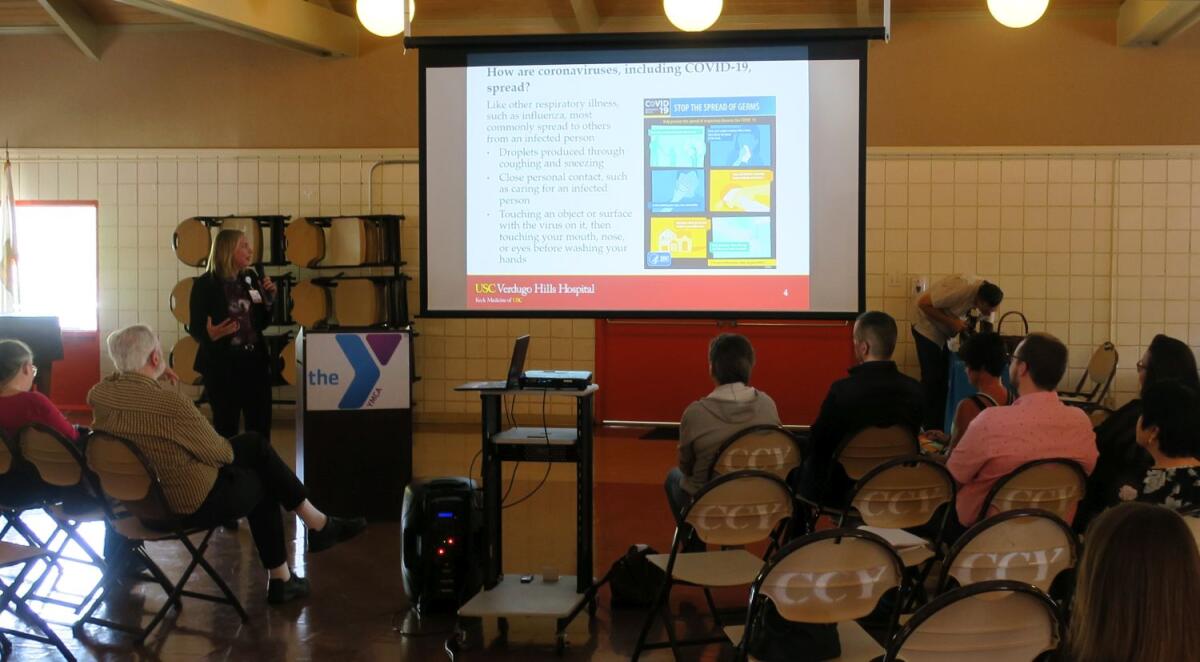As pandemic worry of the novel coronavirus mounts, locals learn prevention basics

As hand sanitizer and quarantine supplies fly off store shelves and state and county officials make emergency declarations over the novel coronavirus (COVID-19), one infection control specialist with USC Verdugo Hills Hospital has a simpler recommendation for preventing a pandemic:
Cover your cough. Wash your hands. Stay home if you’re sick.
That was the message Mary Virgallito, the hospital’s associate administrator of Quality and Patient Safety and a registered nurse, shared with a group of health-minded locals Thursday during a talk at YMCA of the Foothills.
“Right now, in L.A. County there is no community spread of the coronavirus,” she said during the March 5 talk. “What that means is we have some time to work together as a community to plan for if the virus does come.”
New information arose Monday, however, when the Los Angeles County Public Health Department recorded its first case of community transmission of the virus.
Two days later, the department announced its first coronavirus-related death — a woman over 60 with underlying health issues — and six new cases, bringing the county’s total to 24, the Los Angeles Times reported.
Virgallito explained while there are many different strains of coronavirus that are not new and that usually present the same symptoms as other common respiratory viruses — cough, fever and difficulty breathing — COVID-19 has not been seen before in the global medical community. That’s why special precautions are being taken, she said.
Despite its novelty, transmission of COVID-19 resembles a cold or flu, in that it is carried in the droplets of an infected host through coughing, sneezing or skin contact and is airborne up to 6 feet.
Preventing the spread of the disease can be as simple as following a basic hygiene protocol, such as not touching your eyes, nose and mouth with unclean hands and keeping surfaces clean with daily wiping.
“Wash your hands frequently and cover your cough — this is something we teach every flu season,” Virgallito said. “Cough into your elbow or cough into a tissue and then clean your hands. And stay home if you’re sick. If you stay home, you can’t spread it to other people.”
Although it is unclear whether La Cañada Flintridge residents traveling abroad might have contracted the virus or are under quarantine outside the city limits, city officials stated in a semimonthly report issued Friday: “There are no known individuals with the coronavirus in La Cañada Flintridge at this time.”
Virgallito recommended people who feel sick contact their physician but refrain from going to the hospital unless they are having difficulty breathing, can’t keep fluids down, are seriously dehydrated or confused.
“If you have none of these symptoms and are feeling a little sick, stay home and call your doctor,” she said. “If you’re not really sick, you might get sick from somebody who has the virus.”
Children have so far not been deemed especially vulnerable, but the elderly and people with health conditions, including cancer, heart and lung disease and immune system illnesses have an increased risk of infection.
La Crescenta resident Jane Rollins, a former infectious disease epidemiologist, came to YMCA of the Foothills to learn tips for protecting her husband, who’s in remission from cancer and living with chronic obstructive pulmonary disease (COPD).
“Coronavirus is not circulating yet but, inevitably, it probably will, so I’m trying to learn as much as I can on his behalf,” she said.
The 68-year-old has stocked up a little on tissues, chicken soup and hand sanitizer and now keeps a bottle of the bacteria-fighting substance in her car so she can wipe surfaces wherever she goes.
“It’s better to be safe than sorry,” she said.
Visit the Los Angeles Times’ blog for continuing live updates on the novel coronavirus in California and around the world.
